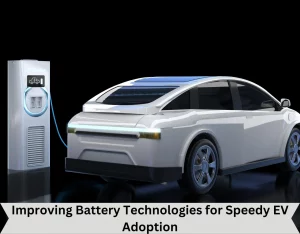ForumIAS announcing GS Foundation Program for UPSC CSE 2025-26 from 27th May. Click Here for more information.
Source: This post has been created based on the article “Improving Battery Technologies for Speedy EV Adoption” published in “The Hindu” on 30th January 2024.
UPSC Syllabus Topic: GS Paper 3 Science and Technology – Developments and their applications and effects in everyday life.
News: The article discusses the working of the lithium battery in Electric Vehicles. Improving Battery Technologies for Speedy EV Adoption It also highlights the issues plaguing Li-ion batteries and discusses the efforts being made to improve EV batteries
What is The Current Status and Future Potential of EV Adoption in India?
EV sales recorded a 50% growth in 2023 compared to 2022. It comprises 6% of vehicles registered in 2023.
The future growth of EV adoption is dependent on advances in battery technology (better cost, longer range, faster charging and improved safety).
How does The Lithium Battery Work?
- Lithium-ion battery consists of two electrodes (an anode and a cathode) separated by a liquid electrolyte.
- Lithium atoms in the anode give up electrons which travel to the cathode through an external wire — this stream of electrons provide the current which powers the motor of the vehicle.
- Simultaneously, lithium ions (now positively charged from loss of an electron) travel through the electrolyte to reach the cathode.
Why is Lithium The Material of Choice for EV Batteries?
- Lithium has a high tendency to give up its electron.
- Its small size enables the ions to efficiently travel between electrodes through the electrolyte.
This means lighter and smaller batteries with the ability to store large amounts of energy can be made.
Want To Know More Topics-
What are The Issues with Li-ion Batteries?
Energy Density: Its energy density, while high compared to earlier battery technologies, is low in comparison to petrol.
Long Charging Time: Batteries are slow to charge (compared to filling petrol at a pump).
Affordability: There is a need to make batteries more affordable and increase their life-span.
Environmental Concerns: These are primarily related to the mining of lithium and other elements (such as cobalt, nickel).
What are The Efforts being Made to Improve EV Batteries?
The efforts toward improving the EV battery can be broadly classified into three approaches:
- Changes in the electrodes: An ideal electrode should be lightweight, store a lot of lithium; and be made of materials that are cheap, non-toxic and easily available.
- Deploying sensing and control infrastructure: For instance, a Battery Management System (BMS) consists of sensors to measure parameters such as temperature, voltage, current, etc. This continuous monitoring can increase safety, extend battery life and speed-up charging.
- Solid-State Lithium Battery (SSB): It seeks to replace the liquid electrolyte used in EV batteries (highly flammable). Also, it provides sufficient structural stability and good separation between the anode and the cathode, thereby replacing the carbon scaffolding used currently. This can greatly reduce the battery’s weight and improve charging speed.
What are India’s Prospects in EV Batteries Development?
1) Presence of EV Ecosystem: India has an expanding market, start-up-friendly environment, friendly government policies, and successful home-grown EV companies (Ather, Ola Electric).
2) R&D for Innovation: Fundamental research in material science at premier universities (IIT- Madras and Mumbai) and government research labs promotes innovation.
3) Semiconductor Industry: The semiconductor industry in India is also contributing advanced sensors and processors that will power the next generation of BMS.
Question for practice:
How do the lithium batteries of current EVs work? What are the issues with them? How can EV batteries be improved to improve their adoption?





